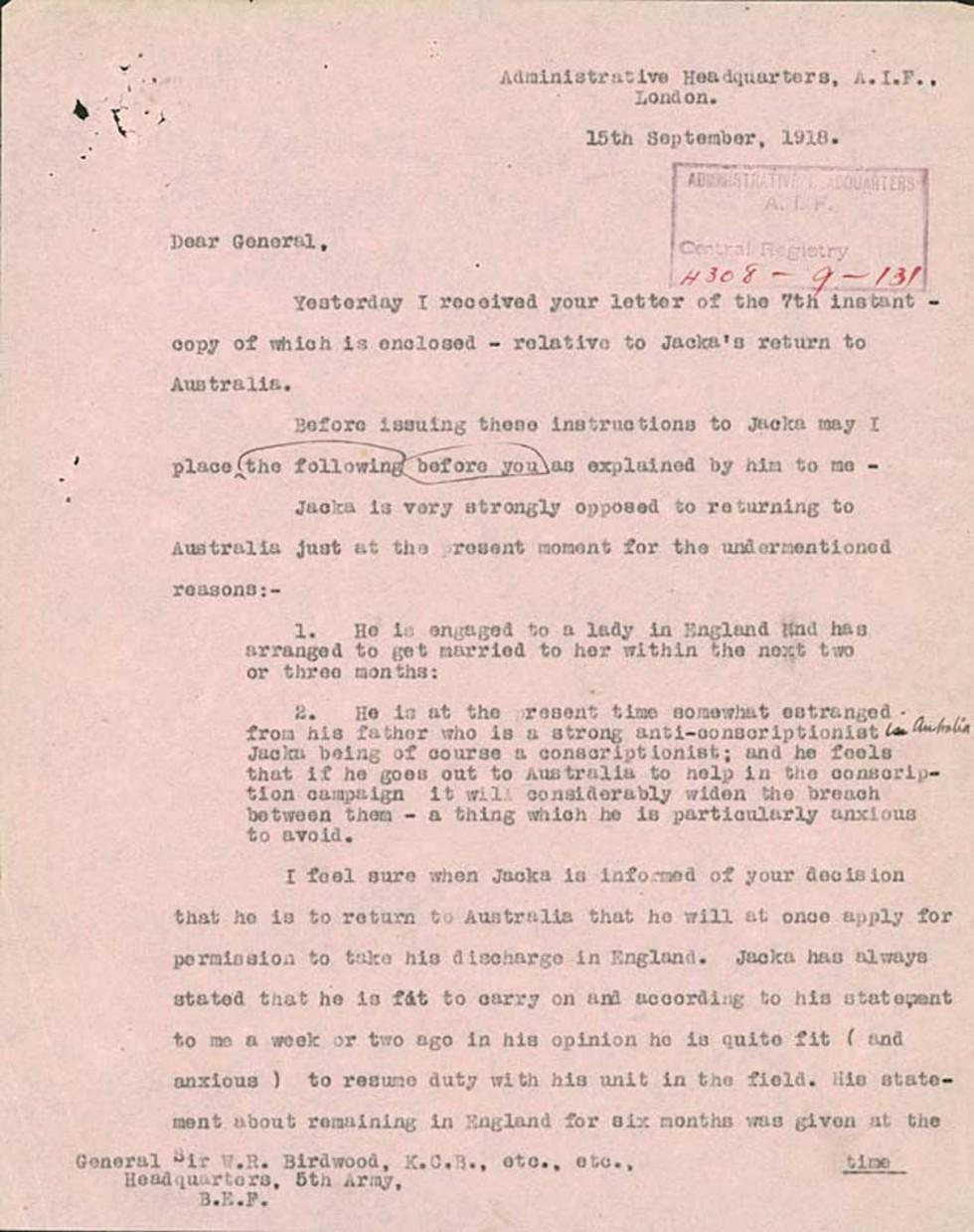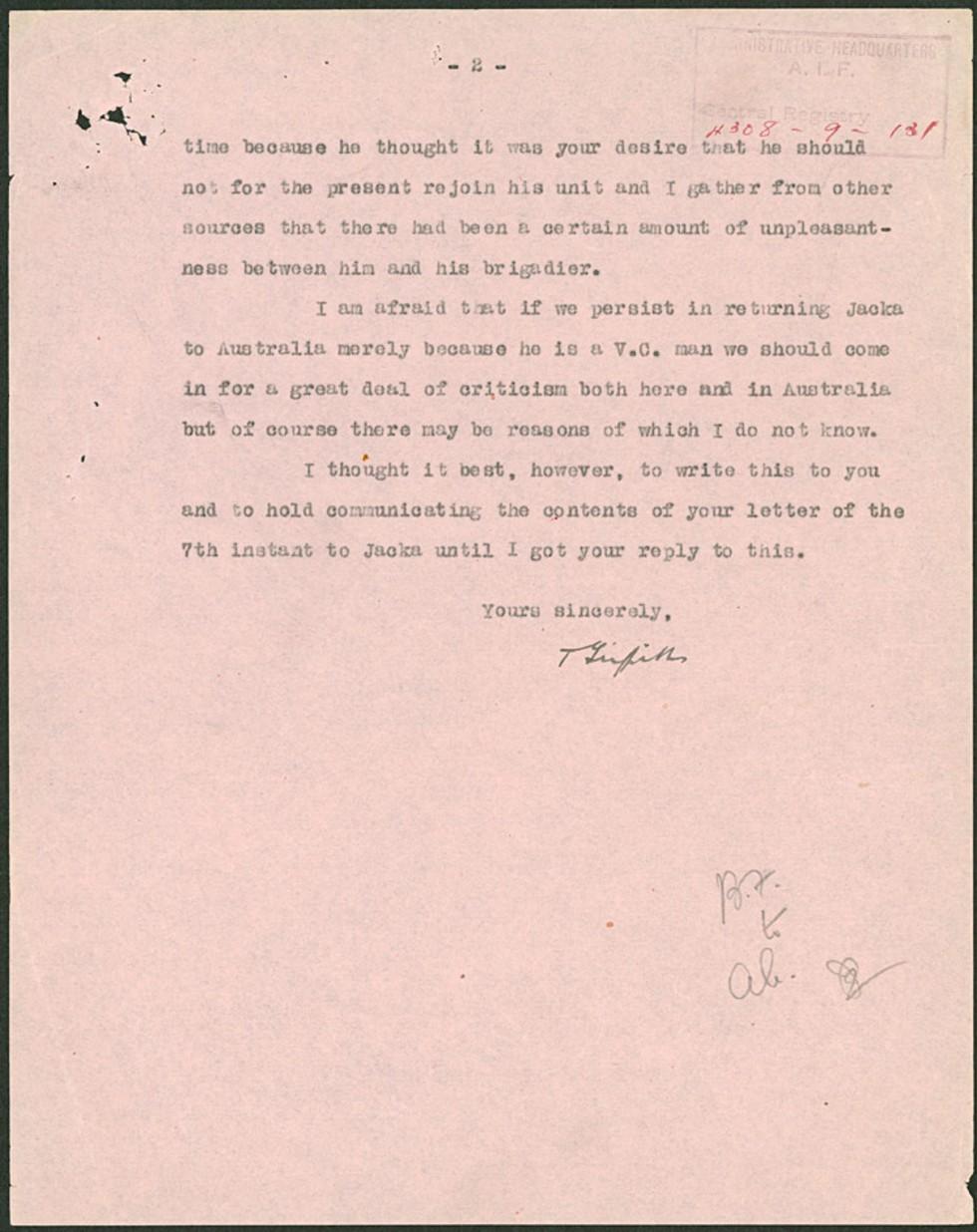

Aboriginal and Torres Strait Islander people should be aware that the National Archives' website and collection contain the names, images and voices of people who have died.
Some records include terms and views that are not appropriate today. They reflect the period in which they were created and are not the views of the National Archives.



[Page 1.]
Administrative Headquarters, A.I.F.,
London.
15th September, 1918.
[Stamped in black ink 'ADMINISTRATIVE HEADQUARTERS A.I.F. Central Registry'. Handwritten within stamp, red ink ‘H308 – 9 – 131’.]
Dear General,
Yesterday I received your letter of the 7th instant – copy of which is enclosed – relative to Jacka's return to Australia.
Before issuing these instructions to Jacka may I place [circled] the following before you [end emphasis] as explained by him to me –
Jacka is very strongly opposed to returning to Australia just at the present moment for the undermentioned reasons:-
1. He is engaged to a lady in England and has arranged to get married to her within the next two or three months:
2. He is at the present time somewhat estranged from his father who is a strong anti-conscriptionist [handwritten addition] in Australia [end addition], Jacka being of course a conscriptionist; and he feels that if he goes out to Australia to help in the conscription campaign it will considerably widen the breach between them – a thing which he is particularly anxious to avoid.
I feel sure that when Jacka is informed of your decision that he is to return to Australia that he will at once apply for permission to take his discharge in England. Jacka has always stated that he is fit to carry on and according to his statement to me a week or two ago in his opinion he is quite fit (and anxious) to resume duty with his unit in the field. His statement about remaining in England for six months was given at the time [word underlined.]
[Recipient's address]
General Sir W.R. Birdwood, K.C.B., etc., etc.,
Headquarters, 5th Army,
B.E.F.
[Page] -2-
[Added in red pen ‘H308 – 9 – 131’.]
[continued from page 1: His statement about remaining in England for six months was given at the...] time because he thought that it was your desire that he should not for the present rejoin [sic] his unit and I gather from other sources that there had been a certain amount of unpleasantness between him and his brigadier.
I am afraid that if we persist in returning Jacka to Australia merely because he is a V.C. man we should come in for a great deal of criticism both here and in Australia but of course there may be reasons of which I do not know.
I thought it best, however, to write this to you and to hold communicating the contents of your letter of the 7th instant to Jacka until I got your reply to this.
Yours sincerely,
[Handwritten signature: T Griffiths
[Handwritten note:] BF to AC [Illegible initials.]
This typed letter, which is part of Captain Albert Jacka's service record, relates to his proposed return to Australia for a six-month furlough. It was written on Jacka's behalf by Brigadier General Tom Griffiths, and is to General Sir WR Birdwood of the British 5th Army, former commander of the Australian and New Zealand Army Corps (ANZAC). It is dated 15 September 1918 and is part of ongoing communications involving the Administrative Headquarters of the Australian Imperial Forces in London.
Learning resource text © Education Services Australia Limited and the National Archives of Australia 2010.
Learn how to interpret primary sources, use our collection and more.
